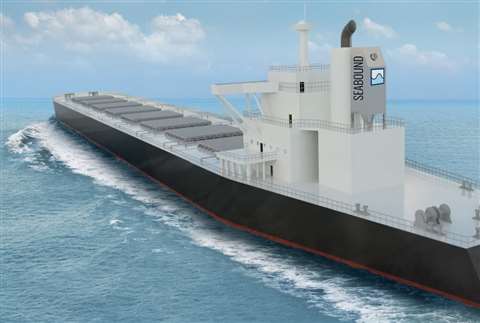Start-up touts marine carbon capture system
21 April 2023
Process converts quicklime into limestone, locking in CO2, company says
Climate tech start-up Seabound said its patent-pending compact carbon capture device is a cost-effective method to capture CO2 onboard vessels.
Lomar Shipping’s lomarlabs, a subsidiary designed to accelerate deployment of innovative maritime technologies, is collaborating with Seabound to bring the product to market. This venture is spearheaded by former Lomar Technical Director Stylianos Papageorgiou, who has been appointed its Managing Director.
Seabound said its carbon capture device that can be retrofitted into a ship’s engine exhaust at the funnel. The CO2 chemically reacts with pebbles of quicklime, which then convert into limestone, keeping the CO2 locked in. The limestone pebbles are temporarily stored onboard before the ship returns to port, without any need for energy-intensive CO2 separation, compression, or liquefaction, the company said. The company said the pebbles are safe, inert and non-toxic; abundantly available worldwide and reasonably priced. Once back in port, the limestone pebbles would be offloaded and either sold in pure form or turned back into quicklime and CO2, for the quicklime to be reused onboard another vessel and the CO2 sold for utilization or sequestration.
Preparations to install this equipment onboard the first ship will take place in May and June this year to run the first-ever pilot project throughout this summer.

This project is part of the Clean Maritime Demonstration Competition Round 3 (CMDC3), which was announced in September 2022, funded by the UK Department for Transport and delivered in partnership with Innovate UK. As part of the CMDC3, the Department allocated £60m to 19 flagship projects supported by 92 UK organisations to deliver real-world demonstration R&D projects in clean maritime solutions. Projects will take place in multiple locations around the UK from as far north as the Shetland Isles and as far south as Cornwall.
“lomarlabs is advising on engineering and design for this transformative solution, adapting it to the realities of everyday commercial shipping operations,” Stylianos said. “We help formulate pilot tests on Lomar vessels, and fine-tune the business model using our industry insight to help make a viable business. We share our experience and network to develop solutions that have the potential of delivering systematic change for our maritime industry.”
Seabound Co-Founder & CEO Alisha Fredriksson said the company aims to demonstrate that the shipping industry doesn’t have to wait to decarbonize in 5-10+ years, but that there are already viable solutions coming to the market now.
“We are keen on exploring technologies that will unlock maritime innovation and lead to the decarbonisation of our industry,” said CEO of Lomar Shipping Nicholas Georgiou. “With lomarlabs and Seabound’s conjoined efforts, we are excited to accelerate our involvement in the mission towards safer, cleaner oceans and contribute to bringing zero-emission shipping from theory to practice.”




